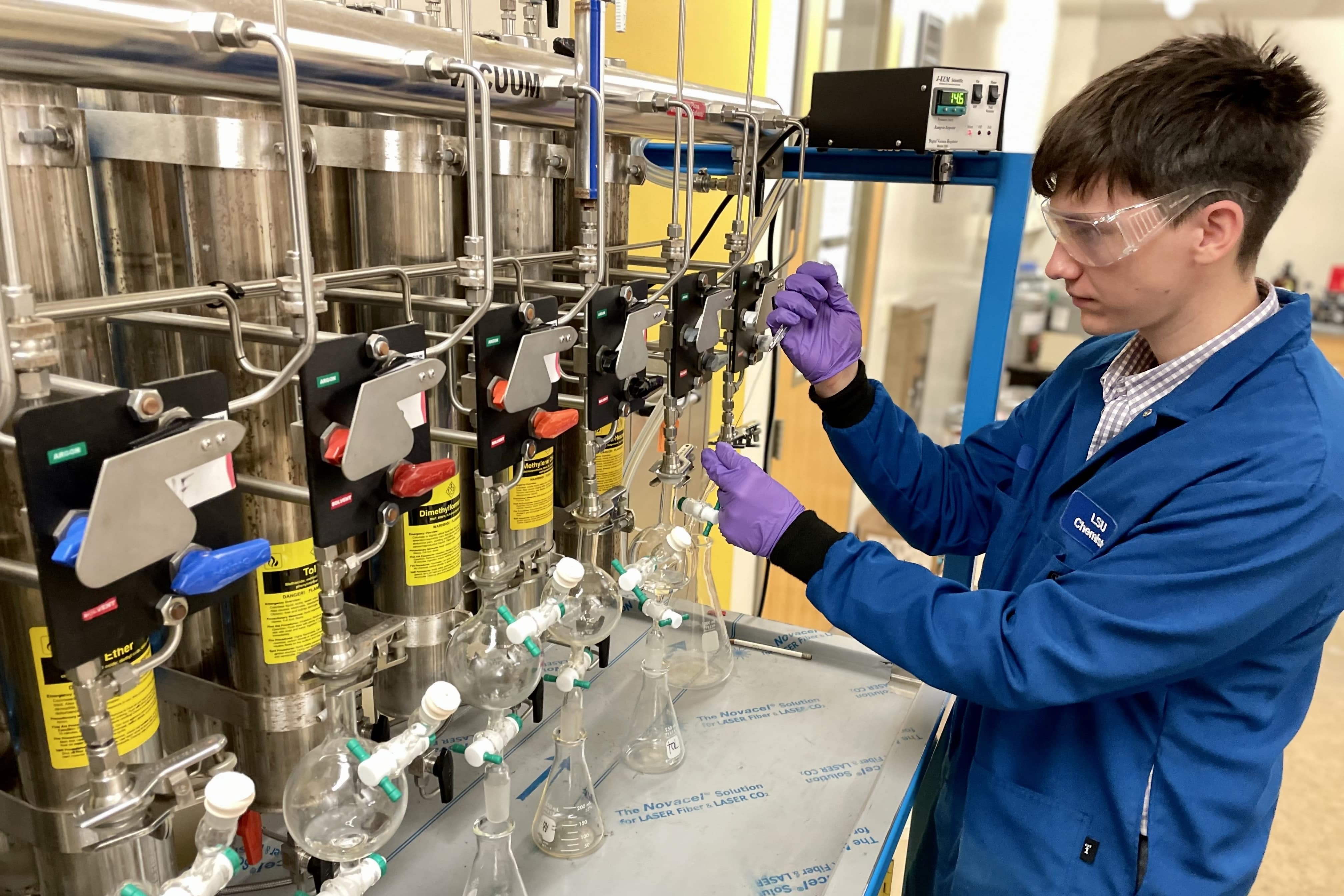Undergraduate Research

2022 Goldwater Scholar Cale Locicero conducting research in the lab of Professor Rendy Kartika.
Research is the systematic investigation into and study of materials and sources in order to establish facts and reach new conclusions. In Chemistry, that typically means doing experiments or calculations to investigate chemical phenomena. The American Chemical Society (ACS) states that:
- “Undergraduate research allows students to integrate and reinforce chemistry knowledge from their formal coursework, develop their scientific and professional skills, and create new scientific knowledge.”
- “Conducting undergraduate research with a faculty advisor allows the student to draw on faculty expertise and encourages a student-faculty mentor relationship.”
- “A student using research to meet the ACS certification requirements must prepare a well-written, comprehensive, and well-documented research report, including safety considerations where appropriate.
For an excellent description of the nature of research, the benefits and the challenges, check out the ACS website.
How to get involved in undergraduate research?
Here are some questions you might ask yourself:
- What classes have I really enjoyed that I have a natural flare for? [organic, physical, analytical ….]
- Are you very mathematical? [analytical, physical, computational]
- Do you like cooking? [synthesis]
- What kind of career appeals to you after graduation and what kind of research might be most relevant? [grad school, analytical chemist in industry, teacher … check out former LSU chemistry majors for some inspiration)
- Then check out our faculty web pages to see what they do. Coming soon you search by traditional disciplines [organic, analytical, physical, inorganic … like the classes you have been taught] or by research themes [energy, materials, biological, environmental, spectroscopy etc.]
- Send your first choice research advisor an email explaining why your find their work interesting. Explain what stage you are at in your degree and ask if they potentially have any openings in their lab. Ask if you can make an appointment to talk about the possibilities.
- If your first choice doesn’t pan out … try a couple more professors.
CHEM 2900: students can register for CHEM 2900 any time after their freshmen year. This is a pass/fail course and can be taken for 1-2 hours of credit.
CHEM 3900: students can be registered for Chem3900 once they have passed Chem3491 (Physical Chemistry I). You can be registered for Chem3900 for additional semesters and receive credit for up to 6 credit hours. There is also a limit of 8 credit hours in the combination of Chem2900 and Chem3900.
CHEM 3900 requires the original research report required for ACS certification. We also have a requirement for a mid-semester oral presentation.
CHEM 3900 can be taken for 1, 2 or 3 hours of credit per semester. Each credit hour requires a minimum of 3 hours of work per week on your project.
Two credit hours of CHEM 3900 are required for Chemistry majors in the following concentrations: Chemistry, Biological Chemistry, Environmental Chemistry, Polymers, Materials and Chemistry and a Second Discipline.
Three credit hours of CHEM 3900 are required for Chemistry majors in the Chemical Physics concentration.
Students in the Pre-Professional Chemistry or Secondary Education concentrations are not required to take CHEM 3900. They are still welcome, and indeed encouraged, to pursue a research experience.
Students must obtain the CHEM 2900 or CHEM 3900 Registration Form from the Undergraduate Chemistry Office (109 Choppin Hall). After a research professor agrees to allow a student to work in their research lab and signs the form, the student returns to the form to the Undergraduate Chemistry Office and is added to the course. These “research for credit” classes cannot be added to a student’s schedule using the myLSU scheduler; this can only be done by staff in the Undergraduate Chemistry Office.
You must be a member of the Honors College. This requires 3 semesters of CHEM 3900 and the writing and defense of a thesis.
The LSU Discover Undergraduate Research program supports student participation in faculty-mentored research and professional-level activities. Students may apply for research stipends and travel awards for conferences.